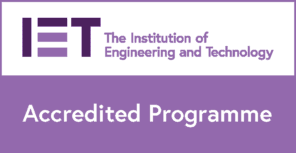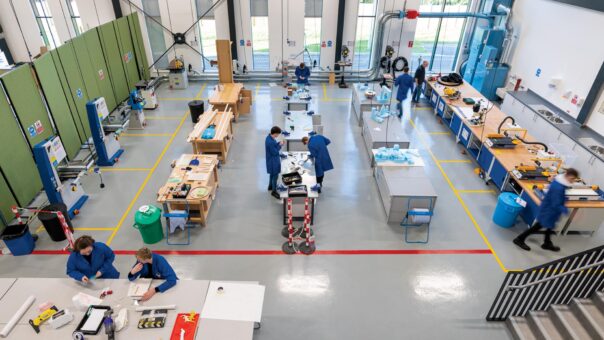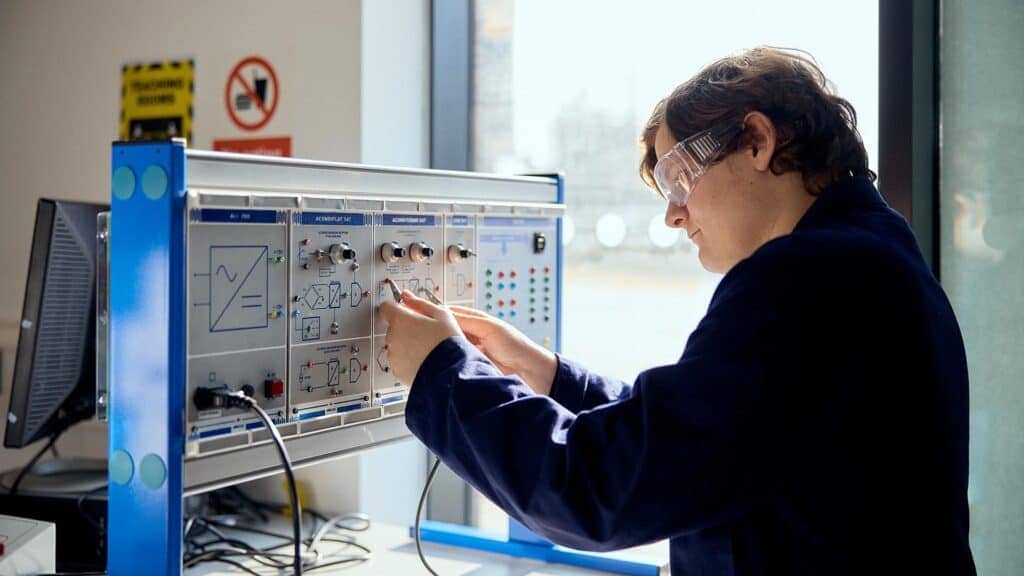Top 30
UK university out of
123 institutions
Guardian University Guide 2026
Gold
rated university in the Teaching Excellence Framework
TEF 2023
Top 30
in the UK for teaching quality
The Times and Sunday Times Good University Guide 2025
Overview
Understand the key aspects of electronic and electrical engineering
Our BEng (Hons) Electronic and Electrical Engineering course provides you with a deep understanding of the core aspects of electronic and electric engineering within the context of the rapidly-growing fields of electronics, communications, smart systems, electrical power and machines.
Institute of Engineering and Technology (IET) accreditation
This course is accredited by the IET, one of the world’s leading professional societies for engineers and technicians. The accreditation means that it will be easier for you to apply for professional registration as a chartered or incorporated engineer after graduation.

Learn the science behind electrical and electronic systems
From circuit design and analysis to power electronics, you will develop a strong level of knowledge and understanding of a wide range of electronic and electrical engineering systems and applications.
Study specialist areas including:
- Circuit design and analysis
- Digital systems
- Signal processing
- Communcation systems engineering
- IoT software control and instrumentation
- Power electronics
- Electrical machines.
Discover our specialist engineering laboratories
Our dedicated engineering teaching and practice spaces allow you to use first-class, industry-standard equipment throughout your studies, as you gain a professionally-relevant and engaging engineering learning experience.
Facilities include:
- Dedicated teaching labs
- Machine tool workshop
- Project workshop
- Computer-aided engineering suite.

Develop the right skills to thrive within the industry
This course has been designed in partnership with local businesses to ensure you are ready for the industry when you graduate and you will complete multiple design-build-test challenges that test your theoretical engineering understanding and practical skills in line with current industry standards.
Gain vital industry experience with work placement opportunities
We can support you in finding and applying for a suitable year-long work placement for between your second and third years of study, which gives you the opportunity to put your studies in practice, improve your CV and develop your professional network ahead of your career within the industry.
Apply your learning to practical projects
The University of Chichester is a member of the unique CDIO (Conceive – Design – Implement – Operate) worldwide initiative, which means our courses are designed to be practical and lab-focused from the beginning.
This ensures that you receive an engaging experience that encourages interdisciplinary teamworking to solve open-ended problems and develop your communication skills, which will help you stand out in a competitive industry.

On this course you will:
- Gain an in-depth understanding of electronic and electric engineering in line with industry requirements.
- Learn in dedicated engineering labs and use first-class equipment.
- Develop the skills and knowledge required to succeed in a rapid-evolving industry.
- Explore industrial work placement opportunities.
- Apply your theoretical learning and planning through practical, collaborative projects.
Integrated Foundation Year Option
We offer an integrated foundation year with BEng (Hons) Electronic and Electrical Engineering. This means you have the option to complete an extra year of study before starting the BEng to build your subject knowledge and develop your academic writing, reading and research skills. This option is for you if you are interested in engineering but do not meet the course entry requirements yet, or if you want more time to prepare for higher education.
The Course
Gain a comprehensive understanding of electronic and electrical engineering
Rowan
Year One
In your first year, you will explore the key fundamentals of electronic and electrical engineering, as well as computer-aided engineering, mathematical principles and mechanical applications.
Year Two
Your second year builds on your previous learning to explore more specialised elements of electronic and electrical engineering, including power systems, electronic machines and digital design.
Year Three
In your third year, you will work as part of group to undertake a final engineering project that will act as a culmination of your studies.
Alongside this, you will explore industrially-relevant elements such as renewability and sustainability, as well as understand basic business concepts within engineering contexts.
Modules
Select a year
Computer Aided Engineering I
This module provides a basic introduction to several software packages used in BEng degrees. You will gain a basic competency in using these software packages. This module also stresses the importance that computer-aided engineering (CAE) plays in modern engineering practice.
Electrical Principles
The module will provide you with the fundamentals, tools and techniques required for DC and AC circuit analysis. You will be introduced to the fundamental properties of electromagnetic fields and their application in engineering context.
Engineering Laboratory 1
This module develops your basic laboratory and analytical techniques and develops your mathematical, statistical and IT skills. You will practise recording laboratory data and maintaining a lab-book. You will encouraged to think independently, analytically and creatively in order to interpret laboratory data and understand it in light of available literature.
Engineering Projects
This year-long module is an opportunity to work within a group on a defined project offered by departmental staff. You will develop your research, planning and practical skills, from inception to completion, and develop skills in appraising your results to identify solutions supported by relevant theory and literature.
Mathematical Principles I
This introductory module provides a mathematical foundation for Engineering students. This module assumes some experience in applied mathematics at level 3 (A level, BTEC) and is essential for studying other modules in electrical and mechanical engineering.
Mechanical Principles
In this module you will explore statics, dynamics thermodynamics and fluid mechanics. You will gain a wide understanding of the basic principles of mechanical engineering.
Analogue and Digital Design
This module introduces the tools and techniques you will use to analyse and design analogue circuits and digital systems.
Control and Instrumentation
This module will introduce you to the important fields of instrumentation, sensing and control design for electromechanical systems. You will then be able to select a suitable transducer and associated system for a given measurement application and to consider possible alternative solutions and demonstrate a thorough understanding of feedback control system principles.
Engineering Laboratory (Electrical)
This module builds on your studies in the previous Engineering Laboratory module and develops your laboratory and analytical skills as well as your mathematical, statistical and presentation abilities.
You will record laboratory data and maintain a lab-book. You will be encouraged to think independently, analytically and creatively to interpret laboratory data and understand how it can be used by comparison with theory and other analytical methods.
You will communicate your findings effectively in developing electronic laboratory reports.
Power Systems & Electrical Machines
This module will introduce you to the fundamental semiconductor devices, their operation and characteristics, and their applications in power electronic converters and how these are used in electrical energy conversion. You will also discover the basic types of electrical machines and how they are used to convert electrical energy into mechanical energy and vice versa.
Mathematical Principles II
This module builds on your studies in Mathematical Principles I and is essential for studying other modules in both electrical and mechanical engineering.
2nd Year Engineering Projects
This year-long module is an opportunity to work within a group on a defined project offered by departmental staff. You will develop your research, planning and practical skills, from inception to completion, and develop skills in appraising your results to identify solutions supported by relevant theory and literature.
Business for Engineers
This module will give you a basic grounding in business so that you can appreciate the importance of business in engineering and have the business knowledge necessary to set-up and run a limited business.
Communication Systems
This module will introduce you communications systems and takes a wide-ranging approach while focusing on the core theoretical concepts required by all communications systems.
Control Engineering
This module will give you a thorough understanding of the principles of a closed-loop control system.
The module will also provide a framework within which you can carry out tasks such as state -space modelling, control performance analysis, controller design and synthesis, with applications to Electrical, Mechanical and Mechatronics systems.
Individual Engineering Projects
This module is an opportunity to work in a group on a defined project offered by departmental staff.
You will develop your research, planning and practical skills, from inception to completion, and develop skills in appraising your results to identify solutions supported by relevant theory and literature.
You will document a detailed project plan and present your work practically, visually and through presentation.
You will also get the opportunity to develop your skills in time management, constructing and documenting a detailed project plan and presenting and defending your work visually and orally.
Renewable Energy & Sustainability
This module will introduce you to the fundamental operating principles of commonly adopted renewable energy sources and the economic and ecological impact of these different generation types. You will cover electrified transportation and explore the technologies for future ‘smart grid’ power networks.
Teaching and Assessment
Feel the support of our expert and experienced staff
Teaching
The course is delivered through seminars, workshops, tutorials, computer labs, physical labs and project practical time. You will spend about 50% of your time in seminars and tutorials, and the remaining 50% in labs or completing project work.
In addition to scheduled learning activities, you will need to complete independent study outside of class hours.
Smaller class sizes to help your development
Our commitment to smaller class sizes allows you to feel more confident to discuss your ideas in a supportive environment, and allows your tutors get to know you and how best to aid your development.
Assessments
You will be assessed through a range of assignments, including:
- Coursework
- Written exams
- Lab and practical work
- Project work
- Presentations
- Online tests.
Facilities
Learn in our state-of-the-art Tech Park building
Discover our £35 million Tech Park
Our Bognor Regis campus boasts the £35m Tech Park and brings together science, technology, engineering, arts and mathematics courses on one state-of-the-art site.
Facilities include:
- Dedicated engineering workshop and teaching spaces
- Electronic and mechanics laboratories
- Machining centre
- Renewable labs
- Power electronics and automation lab
- Electrical machines lab
- Digital electronics lab.
Electronic and mechanics laboratories
Our specialist engineering and mechanics laboratories provide you with industry-standard equipment.
Expert staff
Our industry-experienced staff get to know you and your learning needs to help you thrive.
Learning Resource Centre
The Learning Resource Centre (LRC) contains the library, a café, IT/teaching rooms and the Support and Information Zone (SIZ).
Library
Our campus library holds more than 200,000 books and over 500,000 eBooks.
Work Placements
Prepare for your career with practical placements
You can apply for a year-long industrial placement during your degree.
As well as giving you the opportunity to put your studies into practice and use the skills you develop on your course, undertaking a placement helps to improve your CV and show employers that you’ve already completed work in industry when you graduate.
Placements years usually take place between your second and third year of study. You will spend one year working with a company in industry before returning to the University to complete your final year. This effectively extends your studies by one year.
The placement will be a paid position, with pay at or above the National Minimum Wage.
Placement years are competitive. We will support you in finding and applying for a suitable placement, but we are unable to guarantee placements.
Study Abroad
Explore the opportunity to study part of your course abroad
As a student at the University of Chichester, you can explore opportunities to study abroad during your studies to enrich your educational experiences.
It’s a chance to broaden your horizons, a great opportunity to meet new people, undertake further travelling and to immerse yourself within a new culture.
You will be fully supported throughout the process to help find the right destination and institution for you and your course. We can take you through everything that you will need to consider, from visas to financial support, to ensure you get the best out of your time studying abroad.
Integrated Foundation Year
Develop your academic skills before your degree begins
We offer an integrated foundation year with BEng (Hons) Electronic and Electrical Engineering. This means you have the option to complete an extra year of study before starting the BEng to build your subject knowledge and develop your academic writing, reading and research skills. This option is for you if you are interested in engineering but do not meet the course entry requirements yet, or if you want more time to prepare for higher education.
This varied foundation course is designed to make our STEM degrees more accessible and is delivered through small, interactive seminars and tutorials as well as practical labs. You will develop your research, communication, teamwork and problem-solving skills and cover a range of topics including physics, mathematics, electronics and computing, and the practical application of these to engineering disciplines through design-build-test challenges.
This Foundation Year prepares you to transition to our other Engineering degrees and is not a standalone programme.
Careers
Gain the right skills to help you thrive within the industry
The demand for electrical engineers continues to grow year-on-year, and you will have the knowledge and skills required to succeed in a competitive and rewarding industry.
In addition, you will develop analytical, technical, communication and collaboration skills, which are all highly transferable and required by a wide range of employers and industries.
You could work in:
- Electronics
- ICT
- Automotive industry
- Manufacturing
- Electrical power
- Finance
- Transportation
- Construction
- Utilities.
Many electronics companies also have research and development departments where electronic and electrical engineering graduates can work on developing next-generation technologies.
Course Costs
Course Fees 2026/27
UK fee
International fee
EU/EEA Fee Reduction Scholarship
EU/EEA students automatically pay the equivalent of UK fees via the EU/EEA Fee Reduction Scholarship
For further details about fees, please see our Tuition Fee page.
For further details about international scholarships, please see our Scholarships page.
To find out about any additional costs on this course, please see our Additional Costs page.
Entry Requirements
BEng (Hons) Electronic and Electrical Engineering typical offer:
UCAS
A levels
BTEC
T Level
International Baccalaureate
IELTS
Contextual offers
We believe everyone deserves an equal opportunity to pursue higher education, regardless of their background.
When we receive your application we consider your personal circumstances and the factors surrounding your achievements to see if you are eligible for a contextual offer. This is an offer with a reduced entry tariff – typically the equivalent of 16 fewer UCAS points (two A-level grades).
Applicants who are predicted to achieve two or more (A-level) grades better than the published typical offer will normally be made the typical offer, rather than a reduced offer. For example, where the predicted grades are BBB, and the published typical offer is BCC, a BCC offer would be made.
Find out more about our contextual offers.
Optional Integrated Foundation Year
We also offer BEng (Hons) Electronic and Electrical Engineering with and Integrated Foundation Year. This course is for you if you have not met the course entry requirements yet, or if you feel like you may need a little more preparation to make the most of your university studies.





